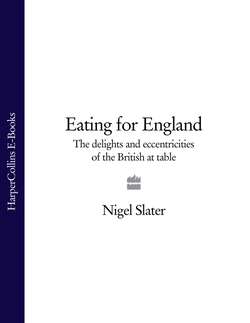Читать книгу Eating for England: The Delights and Eccentricities of the British at Table - Nigel Slater - Страница 21
The Coffee Percolator
ОглавлениеThere is a smell in the hall. Dark notes of burning rubber and something exotic, rich, bitter. I push open the door to the kitchen to see my father concentrating intently on a tall, shiny jug plugged into the electric socket by the Aga, its glass lid covered in dancing beads of condensation. Dad is unusually red in the face, and his tie is crooked. He’s looking slightly panic-stricken. The Formica counter is freckled with dark brown grains, and the silver jug thing with the glass lid is starting to make an excited plop-plipping sound. Steam seems to be coming from both the machine and my dad.
‘It’s the new coffee percolator,’ announces my mother, who is standing next to him with the noticeably resigned air of a woman who has seen canoes, fishing rods, chess sets, marmalade pans and flashing pink Christmas-tree lights that never worked and should have gone back given the same brief moment of furious attention. I am not quite sure why my father has invested in this particular contraption, especially as we don’t really drink coffee anyway, apart from the occasional cup of Maxwell House which we make half-and-half with hot milk. We are simply not a coffee family, and to be honest I am not sure I know anyone who is. Not even the Griptons, and they have an in-and-out gravel drive.
But a coffee percolator we now have, and we all stand round it, excitedly awaiting the result. My father says something about my mother saying she always wanted a perky copulater, which I don’t understand and at which she snaps a disgusted, ‘And that’s enough of that, thank you!’
‘Do you think it’s ready yet? It’s been a while,’ says Mum after a suitable period of awed silence. ‘I don’t know,’ admits my father, who then mutters something about the instruction booklet being in Italian, which is odd, as we can both clearly see the words ‘Morphy Richards’ on the side of the pot. ‘Rome wasn’t built in a day. Let’s give it a bit longer, eh?’
Mum starts to fold some towels, and is in danger of losing interest. I’m wondering what the coffee will taste like, and whether I’m going to have to finish it if I don’t like it. My dad gets out the Midwinter china and opens up a box of coffee crystals and another of ‘petticoat tails’ shortbread, which he arranges on a plate. He unplugs the pot and pours out the coffee, which instantly hits the bottom of the cup and splashes into the saucer and over the table. ‘Take the cup up to the pot, Tony, you’re making a right old mess,’ says Mum, who is now almost as het-up as Dad. ‘I know, I know. The spout’s too wide, it all comes out in a rush,’ he explains, and then we all go quiet.
‘Do you think you put enough coffee in?’ queries my mother as she puts her cup down. We all sit there, looking down at our pale, watery drink, thin, brown yet peculiarly burnt-tasting. My dad has turned his back to us and is at the sink, battling with the last of the coffee grounds, desperately trying to get them all off the sides of the sink and to rinse them down the plughole. He carefully dries the pot, the glass lid, the little aluminium filter thing that held the grounds, and puts it all back together, bit by bit. Lips pursed, he shoehorns the shiny jug with the glass lid back into its box, slips the instruction booklet down the side, and folds the lid in at the sides. He takes the box out to the garage and puts it on the top shelf, next to the chess set and the box of pink flashing Christmas-tree lights.
